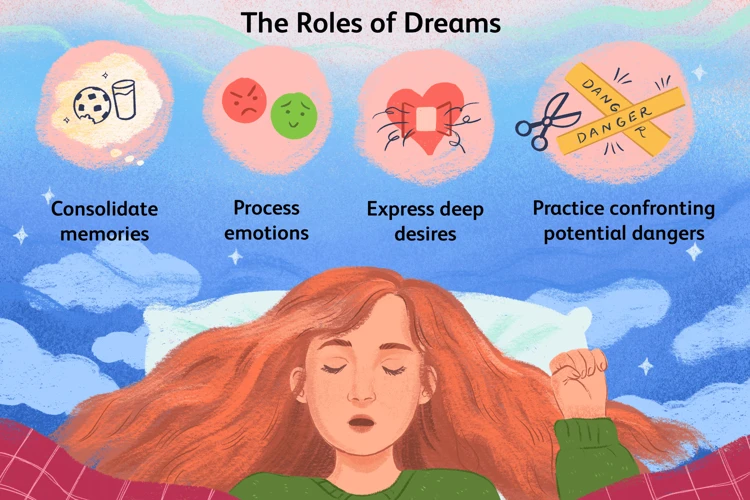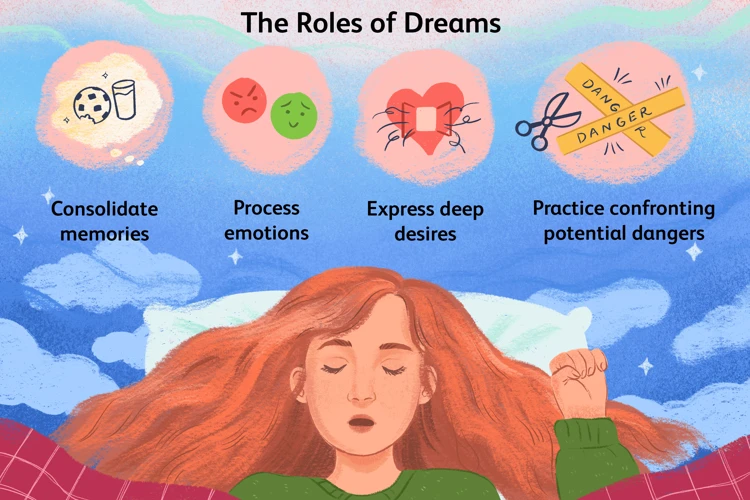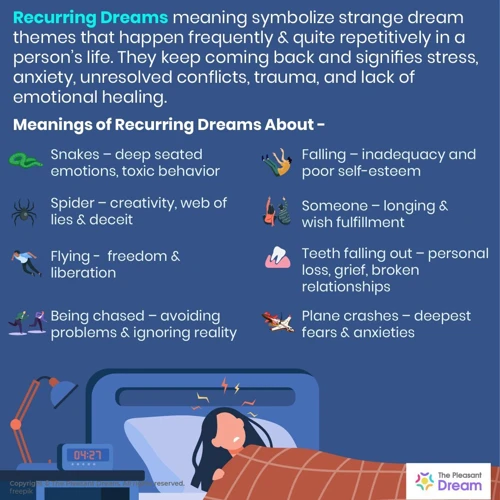Throughout history, dreams have held a mysterious allure, captivating the human mind with their enigmatic messages and symbolism. Recurring dreams, in particular, have intrigued both dreamers and researchers alike, as they often leave individuals pondering their significance and hidden meanings. Could these recurring dreams be more than just fragments of our imagination? Could they be glimpses into past-life experiences, offering a connection to a time and existence beyond our current reality? In this article, we delve into the fascinating realm of recurring dreams and explore the possibility of their connection to past lives, combining ancient beliefs with modern scientific perspectives to unravel the mysteries that lie within our dreamscapes.
Understanding Recurring Dreams

Recurring dreams can be both captivating and perplexing, leaving dreamers questioning their origins and significance. These types of dreams occur when a particular dream or theme repeats itself over a period of time. Definition of Recurring Dreams Recurring dreams are characterized by their repetitive nature, often involving similar settings, characters, or scenarios. While the specific content may vary, the underlying theme remains consistent, which distinguishes them from ordinary dreams. Common Themes in Recurring Dreams Recurring dreams can encompass a wide range of themes, including falling, being chased, or being unprepared for an important event. These themes often reflect unresolved emotions or conflicts in the dreamer’s waking life. Exploring the meaning of recurring dreams can provide valuable insight into one’s subconscious mind and assist in personal growth. To dive deeper into the meanings and symbolism behind recurring dreams, check out this guide on recurring dream meanings. Additionally, if you’re interested in understanding how unresolved emotions can manifest in recurring dreams, this article on exploring recurring dreams and unresolved emotions can offer valuable insights. If you’re looking for tips on how to break the cycle of recurring dreams, you can find helpful suggestions in this article on tips for breaking the cycle of recurring dreams.
Definition of Recurring Dreams
A recurring dream is a type of dream that repeats itself over a period of time. It is characterized by its persistent nature, unlike ordinary dreams that tend to vary in content. Here are some key points that define recurring dreams:
1. Repetitive Nature: Recurring dreams involve the recurrence of specific dream elements, themes, or scenarios. The dreamer experiences the same or similar dream multiple times, with minor variations in details.
2. Persistent Themes: These dreams often revolve around particular themes, such as being chased, falling, or being unprepared for a significant event. These recurring themes may reflect unresolved emotions or conflicts in the dreamer’s waking life.
3. Familiarity and Recognition: Recurring dreams tend to evoke a sense of familiarity and recognition in the dreamer. When experiencing such a dream, individuals may have a feeling of “I’ve been here before” or a recognition of the dream landscape, even though it may not correspond to any specific real-life location.
4. Long-Term Recurrence: While a single recurring dream can be significant, it is the prolonged repetition over time that truly defines this phenomenon. Recurring dreams can repeat themselves for weeks, months, or even years, making them stand out from other dreams.
5. Emotional Impact: Recurring dreams often have a strong emotional impact on the dreamer. The emotions experienced within these dreams can range from fear and anxiety to joy and comfort. The intensity of these emotions can add to the dreamer’s curiosity and desire to understand the meaning behind the recurring dreams.
Understanding the definition of recurring dreams allows us to recognize their unique characteristics and differentiate them from ordinary dreams. By delving into these defining features, we can begin to explore the potential significance and messages hidden within these persistent dream experiences.
Common Themes in Recurring Dreams
|
Recurring dreams often revolve around common themes that can offer valuable insights into the dreamer’s subconscious mind. Here are some of the most prevalent themes found in recurring dreams:
These are just a few examples of the common themes that may manifest in recurring dreams. It is important to note that the interpretation of these themes can vary for each individual, as dream symbolism is highly subjective. Exploring the personal significance of these recurring themes can provide valuable insights into one’s emotions, fears, desires, and past experiences. |
Reincarnation and Past-Life Experiences

Exploring the concept of reincarnation and past-life experiences opens a doorway to a world beyond our current existence. Beliefs and Concepts of Reincarnation Reincarnation is a belief system found in various cultures and religions, suggesting that after death, the soul is reborn into a new body. The specific beliefs surrounding reincarnation may vary, with some cultures viewing it as a cycle of continual rebirth, while others emphasize the notion of karma and the consequences of past actions. Signs and Indicators of Past-Life Experiences Many individuals claim to have memories or experiences that seem to originate from a past life. These signs can include vivid dreams, unexplained phobias or attractions, and a sense of déjà vu in certain situations. While these indicators are subjective, they contribute to the widespread belief in the possibility of past-life experiences. By examining the concepts of reincarnation and the signs that may point towards past-life connections, we can delve further into the intriguing question of whether recurring dreams may be a gateway to our previous lives.
Beliefs and Concepts of Reincarnation
Beliefs and concepts surrounding reincarnation have been woven into the fabric of various cultures and religions throughout history. Here are some key points to understand about the belief in reincarnation:
– Reincarnation is the belief that the soul or consciousness of an individual is reborn into a new body after death. It suggests that life is a continuous cycle of birth, death, and rebirth.
– This belief is prevalent in religions such as Hinduism, Buddhism, Jainism, and certain branches of Sikhism. These religions view reincarnation as a fundamental aspect of their teachings, emphasizing the importance of karma and the spiritual evolution of the soul.
– According to the concept of reincarnation, the circumstances of one’s current life are influenced by the past actions, choices, and behaviors in previous lives. This idea of cause and effect, known as karma, is believed to shape one’s destiny and opportunities in each subsequent incarnation.
– The purpose of reincarnation is often seen as a means for individuals to learn and grow spiritually, ultimately achieving enlightenment or liberation from the cycle of birth and death.
– Different cultures and religions have varying beliefs about the mechanisms of reincarnation, such as how the soul is chosen for a particular body or the existence of a transitional state between lives.
– While not universally accepted, some individuals outside these religious and cultural contexts also hold personal beliefs in reincarnation. These beliefs may stem from personal experiences, spiritual practices, or philosophical contemplations.
Understanding the beliefs and concepts of reincarnation is crucial in exploring the possibility of past-life experiences and their connection to recurring dreams. These beliefs provide a framework for interpreting the significance and potential messages behind recurring dreams, as they suggest that dreams may offer glimpses into past lives and the experiences of the soul across different lifetimes.
Signs and Indicators of Past-Life Experiences
Exploring the possibility of past-life experiences requires recognizing certain signs and indicators that may suggest a connection to previous lives. These signs can manifest in various ways and can serve as clues to a deeper understanding of one’s existence. One common sign is a strong and unexplainable sense of familiarity with people, places, or historical periods, even though the individual has no logical reason for such recognition. This feeling of déjà vu can be an indication of past-life experiences bleeding into one’s present consciousness. Dreams featuring vivid and detailed scenes from a specific time period or culture can also be a significant sign. These dreams may involve recurring themes or characters, adding to the belief that they represent fragments of past lives. Another indicator can be unexplained and inexplicable skills or talents that seemingly come naturally to an individual. For example, someone who effortlessly plays a musical instrument despite never having received formal training may have honed those skills in a past life. Additionally, irrational fears or phobias that cannot be traced to any traumatic experience in the current lifetime may stem from past-life traumas that have carried over. Exploring these signs and indicators can offer valuable insights into the possibility of past-life experiences and encourage further investigation into the nature of one’s existence.
The Connection Between Recurring Dreams and Past-Life Experiences

The connection between recurring dreams and past-life experiences opens up a world of intrigue and fascination. Exploring the Interpretation of Recurring Dreams Recurring dreams hold a special significance and offer a unique lens through which we can explore our past lives. The interpretation of these dreams can provide valuable insights into unresolved issues or emotions that may stem from our previous incarnations. They often serve as a gateway to accessing buried memories or experiences that are no longer consciously accessible. Parallelism and Continuity in Past-Life Dreams Past-life dreams often exhibit a sense of parallelism and continuity, where the dreamer may find themselves in a different time, place, or identity. These dreams can be vivid and detailed as they unravel connections to a life lived long ago, stirring up emotions and experiences that feel strangely familiar. Emotional Resonance and Familiarity in Recurring Dreams Recurring dreams with past-life implications often come with a heightened emotional resonance, evoking intense feelings of joy, sadness, or even fear. The settings, relationships, and events in these dreams may feel inexplicably familiar, as if we have lived through them before. This emotional resonance serves as a bridge between our past lives and present consciousness. By examining the emotional landscape of recurring dreams, we can begin to unravel the threads of our past-life experiences.
Exploring the Interpretation of Recurring Dreams
When it comes to exploring the interpretation of recurring dreams, there are various approaches and theories that can shed light on their meaning. Here are a few key aspects to consider:
1. Symbolism and Metaphors: Recurring dreams often contain symbolism and metaphors that can offer insight into the dreamer’s subconscious mind. Analyzing these symbols and their associations can uncover hidden messages and emotions. For example, dreaming about being trapped in a maze could represent feeling stuck or unable to find a way forward in a certain area of life.
2. Personal Context: Interpreting recurring dreams requires taking into account the dreamer’s personal context and experiences. Elements such as recurring people, places, or situations may hold significance based on the dreamer’s unique life history. Understanding the underlying emotions and connections to the dreamer’s waking life can provide valuable clues for interpretation.
3. Unresolved Issues: Recurring dreams often address unresolved issues or emotions that the dreamer may not be consciously aware of. These dreams can serve as a way for the subconscious mind to process and work through unresolved conflicts, fears, or desires. Exploring recurring dream themes and patterns can aid in uncovering these underlying issues for introspection and resolution.
4. Collective Unconscious: Some interpretations of recurring dreams delve into the concept of the collective unconscious, a shared reservoir of knowledge and symbols that all humans have access to. Archetypal images and themes that appear in recurring dreams may hold universal meanings that transcend individual experiences. Exploring this aspect can provide a broader understanding of recurring dreams and their significance.
5. Reflective Questions: To delve deeper into the interpretation of recurring dreams, reflective questioning can be a helpful tool. Asking oneself questions like “What emotions am I experiencing in this dream?” or “What conflicts does this dream mirror in my waking life?” can stimulate introspection and aid in uncovering deeper meanings.
Remember, the interpretation of recurring dreams is highly personal, and it’s essential to trust one’s intuition and personal insights when exploring their meaning. Seeking guidance from a dream analyst or therapist experienced in dream interpretation can also provide valuable perspectives on understanding recurring dreams.
Parallelism and Continuity in Past-Life Dreams
Parallelism and continuity in past-life dreams add another layer of complexity to the exploration of recurring dreams and their connection to past-life experiences. In these dreams, individuals may find themselves experiencing a storyline or narrative that continues across multiple dreams, forming a cohesive and continuous narrative thread. This continuity can manifest in various ways, such as the dreamer experiencing different scenes or events from a past life in a chronological order or witnessing the progression of their past-life self’s journey. It is as if the dreamer becomes an observer of their past-life self, gradually uncovering the hidden chapters of a previous existence. This parallelism and continuity within past-life dreams can be a powerful indication of a deeper connection to past lives, as it suggests a consistent and interconnected storyline that transcends the boundaries of time and space. Exploring the patterns and connections within these dreams can provide valuable insights into past-life experiences, helping individuals gain a better understanding of their current life’s purpose and lessons. It is important to approach these dreams with an open mind and a willingness to delve into the symbolism and emotions attached to them, as they may hold profound revelations and opportunities for personal growth.
Emotional Resonance and Familiarity in Recurring Dreams
Emotional resonance and familiarity play a significant role in understanding recurring dreams. One of the distinguishing features of recurring dreams is the intense emotions they evoke. These dreams have the power to stir up deep-seated feelings of fear, anxiety, joy, or sadness, often leaving the dreamer with a strong emotional response upon waking. The emotions experienced in recurring dreams can be so vivid and realistic that they can influence the dreamer’s mood and mindset even after the dream has ended. This emotional resonance suggests a strong connection between the dream content and the dreamer’s subconscious or past experiences.
Recurring dreams often carry a sense of familiarity. Dreamers may find themselves in repeated scenarios or encountering recurring characters that feel oddly familiar, even if they cannot recall such experiences from their waking life. This familiarity can extend beyond the immediate dream context, evoking a sense of nostalgia or recognition that transcends time and space. The familiarity experienced in recurring dreams might indicate a resonance with past-life experiences, where elements from previous incarnations or parallel realities find their way into the dream state. This connection to past lives can create a powerful and enigmatic experience for the dreamer, encouraging further exploration into the possible meaning and implications of these recurring dream encounters.
Scientific Perspectives on Past-Life Experiences

While past-life experiences have long been a topic of interest in various spiritual and religious beliefs, scientific perspectives offer a different lens through which to examine their validity. Exploring Causal Factors of Recurring Dreams From a scientific standpoint, recurring dreams can be attributed to a multitude of factors. These may include psychological processes such as unresolved conflicts, unmet emotional needs, or traumatic past experiences that continue to influence the dreamer’s subconscious mind. Additionally, external factors like stress, anxiety, and certain medications can contribute to the occurrence of recurring dreams. The Role of Memory and Imagination in Recurring Dreams Memory plays a crucial role in shaping our dreams. Our brain combines fragments of past experiences, emotions, and information to create the landscapes and narratives that unfold during sleep. Imagination also comes into play, as our minds have the ability to construct elaborate scenarios and stories during dreaming. The combination of memory and imagination allows us to experience recurring dreams that may contain elements from past lives, even if those experiences are not verifiable in our waking reality. While scientific research has not definitively proven the existence of past-life experiences, studying recurring dreams provides valuable insights into the workings of the human mind and the intricacies of the dream world.
Exploring Causal Factors of Recurring Dreams
Understanding the underlying causes of recurring dreams can shed light on their significance and provide valuable insights into our subconscious mind. Several factors may contribute to the occurrence of recurring dreams. One possible causal factor is unresolved emotions or trauma. When we experience intense emotions or go through traumatic events in our waking life, our subconscious mind may attempt to process and cope with them during sleep, leading to recurring dreams that revolve around these unresolved issues. Additionally, recurring dreams can also be triggered by unaddressed conflicts or persistent stressors in our daily lives. Our mind may be trying to bring attention to these unresolved conflicts and encourage us to find resolution or make necessary changes. Other potential factors include physical or environmental influences such as medications, sleep disorders, or disruptions in sleep patterns. These factors can affect the quality of our sleep and contribute to the recurrence of specific dream patterns. Exploring the causal factors behind recurring dreams requires self-reflection, introspection, and, in some cases, professional guidance. By unraveling the underlying causes, we can gain a deeper understanding of ourselves and work towards achieving personal growth and resolution.
The Role of Memory and Imagination in Recurring Dreams
The Role of Memory and Imagination in Recurring Dreams
Memory and imagination play crucial roles in the formation and manifestation of recurring dreams. Memories from past experiences, both recent and distant, can resurface in our dreams and become recurring themes. These memories are not always accurately represented but are often fragmented, distorted, or combined in unusual ways, giving rise to surreal scenarios within our dreams. Our imagination also comes into play as it fills in the gaps and generates new elements, creating a unique dream landscape.
Memory: Our dreams are deeply intertwined with our personal memories. The brain relies on stored memories to construct dream narratives, and recurring dreams may draw upon specific memories that hold emotional significance. These memories can be from our current lives, reflecting unresolved issues or unfulfilled desires. However, some proponents of the past-life connection theory argue that recurring dreams may tap into memories from previous lifetimes.
Imagination: While memories provide the basis for recurring dreams, the imagination plays a crucial role in their elaboration. Our imagination has the power to blend memories together, alter their details, and create entirely new scenarios. This imaginative capacity can give recurring dreams a fantastical and surreal quality, sometimes even blurring the boundaries between past and present or reality and fantasy.
It’s important to note that the exact mechanisms through which memory and imagination influence recurring dreams are still not fully understood by scientists. However, research suggests that both processes play significant roles in shaping the content and symbolism of these dreams. By better understanding the interplay between memory and imagination in recurring dreams, we can gain insights into the complexities of our subconscious minds and the intricate nature of the dream world.
Case Studies and Personal Experiences

When it comes to exploring the connection between recurring dreams and past-life experiences, case studies and personal experiences can provide fascinating insights. Many individuals have shared compelling stories of their dreams and their perceived connections to past lives. These personal accounts often reveal common signs and clues found within recurring dreams, such as vivid details, detailed historical settings, and a deep emotional resonance. For example, one individual reported having recurring dreams about being a sailor on a tall ship in the 18th century, which led them to research and discover historical records matching their dream descriptions. Another person shared their experience of having recurring dreams about being a child in a war-torn country, which they later learned aligned with their grandparents’ experiences during World War II. These personal experiences serve as intriguing anecdotes that hint at the possibility of past-life connections within recurring dreams.
Compelling Stories of Dreamers Connecting with Past Lives
Intriguing accounts of dreamers connecting with their past lives have been reported throughout history, adding credibility to the notion that recurring dreams may indeed be a sign of past-life experiences. These stories often involve vivid and detailed dreams that transport individuals to different times and places, evoking a strong sense of familiarity and emotional resonance. One such story involves a woman who consistently dreamt of being a seamstress in the Victorian era, complete with intricate details of the period’s fashion and sewing techniques. Curiosity led her to research the era and, to her astonishment, she discovered uncanny similarities between her dreams and historical records. Another compelling story involves a young boy who would recount vivid, consistent dreams of flying fighter planes during World War II. His knowledge of specific aircraft details and historical events surpassed what could be attributed to his age or exposure. These personal anecdotes provide a glimpse into the profound connections that some dreamers experience, driving them to explore the possibility of past-life connections further. The exploration of these stories not only raises fascinating questions about the nature of dreams but also invites us to consider the existence of past lives and the role they may play in shaping our current experiences.
Signs and Clues from Recurring Dreams
Recurring dreams can provide valuable signs and clues that offer insights into our subconscious and potential past-life experiences. These signs and clues can manifest in various ways within the dream itself. Some common examples include recurring dream symbols, recurring dream characters, and recurring dream scenarios. Paying close attention to these elements can help unravel the messages hidden within our dreams.
Recurring Dream Symbols: Symbols play a significant role in our dreams, and recurring symbols can carry even more weight. These symbols may have personal significance to the dreamer or tap into universal archetypes and collective unconscious. For example, seeing a recurring symbol like a key or a ladder may indicate a need for unlocking hidden potential or reaching new heights in life. It is essential to keep a dream journal to track these symbols and reflect on their possible meanings.
Recurring Dream Characters: The presence of recurring dream characters can also hold significant meaning. These characters may represent aspects of ourselves, people from our past or present, or even individuals from our past lives. Observing the interactions and relationships with these recurring characters in our dreams can offer insights into unresolved emotions, relationship dynamics, or connections to our past lives.
Recurring Dream Scenarios: The recurrence of specific dream scenarios can also hold clues about past-life experiences. For instance, experiencing recurring dreams set in a particular historical time period or culture might suggest a connection to a past life during that era. These dreams may bring forth memories or sensations related to that past life, enabling us to explore and understand our previous existence.
It is important to approach these signs and clues with an open mind and rely on our intuition and personal interpretation. Each individual’s experience with recurring dreams is unique, and understanding the messages from our dreams requires self-reflection and introspection. By analyzing and deciphering these signs and clues, we can gain a deeper understanding of our subconscious mind and potentially uncover connections to past-life experiences.
Techniques to Uncover Past-Life Connections in Recurring Dreams

For those intrigued by the possibility of uncovering past-life connections within their recurring dreams, there are various techniques that can aid in this exploration. Dream Journaling and Analysis: Keeping a dream journal and documenting recurring dreams can provide valuable insights into patterns and symbols that may be related to past-life experiences. By regularly recording dreams and analyzing their content, dreamers can identify recurring motifs and themes that may hold clues to their past lives. Past-Life Regression Therapy: Past-life regression therapy is a method that involves accessing past-life memories through hypnosis or guided meditation. This technique allows individuals to delve deeper into their subconscious and potentially uncover past-life connections embedded within their recurring dreams. This therapeutic approach can provide a unique perspective and shed light on unresolved issues or emotions carried over from past lives. By exploring past-life regression therapy, dreamers may gain a deeper understanding of their recurring dreams and the possibility of past-life experiences.
Dream Journaling and Analysis
Dream journaling and analysis is an effective technique for uncovering the hidden messages and patterns within recurring dreams. By keeping a journal or notebook specifically dedicated to recording your dreams, you create a valuable resource for self-reflection and analysis. Here are some steps to follow when utilizing dream journaling and analysis:
1. Record your dreams: Upon awakening, take a few moments to jot down any details, emotions, or images that you remember from your dreams. Be as specific as possible, capturing the essence of the dream while it is still fresh in your mind.
2. Identify recurring elements: Look for common themes, symbols, or characters that appear in your dreams over time. These recurring elements may hold significant meaning and can provide clues to past-life experiences or unresolved emotions in your waking life.
3. Reflect on emotions: Pay attention to the emotions evoked by your dreams. Note any recurring feelings or patterns of emotional response. Emotions can serve as indicators of unresolved issues or important messages from the subconscious mind.
4. Make connections: Compare and analyze your dream journal entries to identify recurring patterns, symbols, or themes. Look for similarities or connections between the dreams and your daily life experiences. This process of reflection can shed light on the possible meaning and messages behind your recurring dreams.
5. Seek guidance: If you’re unsure how to interpret your dreams or are struggling to uncover their deeper meanings, consider seeking the assistance of a professional dream analyst or therapist. They can provide valuable insights and help you navigate the symbolism within your recurring dreams.
Dream journaling and analysis is a powerful tool that allows you to uncover patterns, symbols, and messages within your recurring dreams. It helps you delve deeper into your subconscious mind and gain a better understanding of yourself and your past-life experiences. Remember, the interpretation of dreams is subjective, so trust your intuition and explore the possibilities that arise from your dream journal.
Past-Life Regression Therapy
Past-life regression therapy is a technique used to access and explore past-life experiences through hypnosis or guided meditation. This therapeutic approach aims to uncover hidden memories and emotions that may be influencing our present lives. During a past-life regression session, a trained therapist guides the individual into a deep state of relaxation, helping them access their subconscious mind. Through gentle prompts and visualization exercises, the therapist directs the individual to recall memories of past lives. These memories can manifest as vivid images, sensations, or emotions. It is important to note that past-life regression therapy is not scientifically proven and is often regarded as a form of alternative therapy. However, many individuals have reported profound experiences and insights during these sessions. Proponents of past-life regression therapy believe that exploring past lives can provide healing, resolution, and a greater understanding of one’s current life challenges. By identifying patterns, traumas, or unresolved issues from past lives, individuals can gain clarity, release emotional baggage, and cultivate personal growth. It is recommended to consult with a qualified and reputable therapist experienced in past-life regression before undertaking this therapy.
Interpreting and Utilizing Recurring Dreams for Personal Growth
Interpreting and utilizing recurring dreams can provide valuable opportunities for personal growth and self-discovery. Self-Reflection and Introspection One of the first steps in unlocking the potential of recurring dreams is engaging in self-reflection and introspection. By examining the symbols, themes, and emotions present in these dreams, individuals can gain insight into their subconscious desires, fears, and unresolved issues. Keeping a dream journal can aid in this process, allowing for a deeper analysis of recurring patterns and connections. Seeking Professional Guidance For those who find it challenging to interpret their recurring dreams on their own, seeking professional guidance can be beneficial. Psychologists, therapists, and dream analysts have expertise in understanding the intricate workings of the human mind and can provide valuable interpretations and insights. Through techniques like dream analysis and interpretation, individuals can gain a deeper understanding of themselves and their subconscious motivations, paving the way for personal growth and transformation. By utilizing the power of recurring dreams, individuals have the opportunity to embark on a journey of self-discovery, self-healing, and personal development.
Self-Reflection and Introspection
Self-reflection and introspection play a crucial role in interpreting and utilizing recurring dreams for personal growth. By taking the time to ponder and analyze the content and emotions within these dreams, individuals can gain valuable insights into their inner thoughts, desires, and fears. Here are some techniques to incorporate self-reflection and introspection when working with recurring dreams:
1. Keep a Dream Journal: Maintaining a dream journal is an excellent way to enhance self-reflection. As soon as you wake up, jot down every detail you can remember about your recurring dream. Take note of recurring elements, emotions, and any significant symbols or events. Over time, patterns may emerge that provide deeper understanding.
2. Ask Yourself Guiding Questions: Engage in introspection by asking yourself thought-provoking questions about your recurring dreams. What do certain symbols or events represent to you personally? How do these dreams make you feel? Is there a particular message or lesson you believe your subconscious is trying to convey?
3. Explore Personal Connections: Reflect on your waking life experiences and how they might relate to your recurring dreams. Are there any unresolved conflicts or emotions that mirror the themes in your dreams? Consider any underlying stressors or challenges, as they might be manifesting in your dream’s narrative.
4. Seek Patterns and Themes: Look for recurrent symbols, feelings, or situations within your dreams. This analysis can provide insights into recurring patterns in your life or emotional states. Pay attention to any shifts or progressions in the dream’s storyline, as they may signify personal growth or changing circumstances.
5. Consider Seeking Guidance: If you find it challenging to interpret your recurring dreams on your own, seeking guidance from a professional, such as a therapist or dream analyst, can be beneficial. They can provide alternative perspectives and assist in unlocking the hidden meanings within your dreams.
Remember, the goal of self-reflection and introspection is not only to understand the symbolism and messages within your recurring dreams but also to apply these insights in your everyday life. By integrating these revelations, you can make positive changes, resolve inner conflicts, and foster personal growth and development.
Seeking Professional Guidance
When recurring dreams become a source of distress or confusion, seeking professional guidance can be a valuable step towards understanding their deeper meaning. Here are some avenues to consider when seeking assistance:
- Therapists and Psychologists: Mental health professionals specializing in dream analysis and interpretation can provide valuable insights into recurring dreams. They can help individuals explore underlying emotions, unresolved conflicts, and potential connections to past-life experiences.
- Dream Experts: There are professionals who specifically focus on dream analysis and the exploration of subconscious messages. These experts possess extensive knowledge and experience in understanding and interpreting recurring dreams. Consulting with a dream expert can offer a fresh perspective and deeper understanding of the dreams.
- Past-Life Regression Therapists: For those who strongly believe that their recurring dreams are indicative of past-life experiences, seeking the help of past-life regression therapists may be beneficial. These therapists specialize in guiding individuals through a hypnotic state to access their past-life memories and explore the connections between their present life and their dreams.
- Support Groups: Joining a support group for individuals experiencing recurring dreams can provide a sense of community and shared experiences. Participants can discuss their dreams, exchange insights, and offer support to one another. This can be particularly helpful for those who wish to validate their experiences and gain different perspectives.
When seeking professional guidance, it is essential to choose a reputable and qualified practitioner who aligns with personal beliefs and values. Taking the time to research and select the right professional can greatly enhance the process of understanding and utilizing recurring dreams for personal growth.
Conclusion
In conclusion, the connection between recurring dreams and past-life experiences remains a subject of intrigue and speculation. While there are individuals who firmly believe that recurring dreams can serve as a gateway to previous lives, it is important to approach this concept with a balanced perspective. Recurring dreams can be influenced by a variety of factors, including personal experiences, emotions, and subconscious thoughts. Therefore, it is crucial not to solely rely on recurring dreams as undeniable evidence of past lives. However, the exploration of recurring dreams and their possible connection to past lives can offer valuable insights for personal growth and self-reflection. By keeping a dream journal, analyzing recurring dream patterns, and seeking professional guidance when needed, individuals can delve deeper into the messages and symbolism within their dreams. Ultimately, the interpretation and utilization of recurring dreams are highly subjective and personalized experiences. Whether one believes in past-life connections or views recurring dreams as manifestations of the subconscious mind, they provide a unique opportunity to explore the depths of our psyche and gain a deeper understanding of ourselves.
Frequently Asked Questions
What are the different theories about the meaning of recurring dreams?
There are various theories surrounding the meaning of recurring dreams. Some believe that they reflect unresolved emotions or conflicts in our waking life, while others suggest that they arise from past-life experiences or messages from the subconscious mind.
Can recurring dreams provide insight into our subconscious mind?
Yes, recurring dreams can offer valuable insight into our subconscious mind. By analyzing the patterns and themes present in these dreams, we can gain a deeper understanding of our hidden thoughts, emotions, and desires.
Are recurring dreams always the result of past-life experiences?
No, not all recurring dreams are necessarily linked to past-life experiences. While some individuals believe that recurring dreams provide a glimpse into previous lives, there are other explanations, such as unresolved emotions or repetitive thoughts, that can contribute to their occurrence.
Can recurring dreams help us resolve unresolved emotions?
Yes, recurring dreams often serve as a means for our subconscious mind to address unresolved emotions. By analyzing these dreams and identifying the underlying emotions, we can take steps towards resolving them in our waking life.
Is there scientific evidence to support the concept of past-life experiences?
Scientifically, the concept of past-life experiences is controversial and lacks empirical evidence. However, there have been anecdotal accounts and case studies that suggest the existence of past-life memories.
What factors can contribute to the frequency of recurring dreams?
The frequency of recurring dreams can be influenced by various factors, including stress, trauma, unresolved conflicts, or significant life changes. These experiences can trigger the subconscious mind to replay certain themes or scenarios repetitively.
Can analyzing recurring dreams help us in our personal growth?
Absolutely! Analyzing recurring dreams can offer valuable insights into our psyche, helping us to uncover hidden aspects of ourselves and facilitate personal growth. By consciously exploring and working through the themes presented in these dreams, we can gain a better understanding of ourselves and make positive changes in our lives.
Is dream journaling an effective tool for understanding recurring dreams?
Yes, keeping a dream journal can be a helpful tool in understanding recurring dreams. By recording the details of these dreams, including emotions, symbols, and events, we can identify recurring patterns and themes, leading to a deeper understanding of their meaning.
Can past-life regression therapy uncover connections to recurring dreams?
Yes, past-life regression therapy is a technique that aims to uncover past-life memories and experiences. In some cases, it has been reported to reveal connections to recurring dreams and provide a deeper understanding of their origin.
When should I seek professional guidance for recurring dreams?
If recurring dreams are causing significant distress or interfering with daily functioning, it may be beneficial to seek professional guidance. Psychologists, therapists, or dream specialists can help in interpreting these dreams and provide support in processing any unresolved emotions or conflicts.








